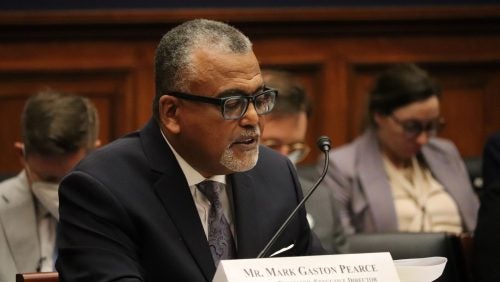Workers’ Rights Institute Director Testifies at Congressional Hearing on Labor Organizing
September 21, 2022

Workers’ Rights Institute Executive Director Mark Gaston Pearce presents opening testimony at a House Committee on Education and Labor hearing. Photo courtesy of the Committee.
Union activity is currently surging in the United States. Efforts to organize workers at large companies like Starbucks and Amazon have captured imaginations and dominated the headlines for months. According to the National Labor Relations Board (NLRB), in the first three quarters of the current fiscal year, union representation petition filings rose 58% over last year.
Last week, Visiting Professor Mark Gaston Pearce, Executive Director of the Georgetown Law Workers’ Rights Institute (WRI), was a witness at a House Committee on Education and Labor hearing, “In Solidarity: Removing Barriers to Organizing.” The hearing sought to highlight the Protecting the Right to Organize Act (“PRO Act”), a bill passed by the House of Representatives earlier this year. Two student research assistants, Daphne Assimakopoulis (L’23) and Shiva Sethi (L’24), accompanied Pearce, using their phones for on-the-spot research and passing him notes to help him respond to questions from committee members.
We spoke with Pearce, who served as NLRB Chairman before joining Georgetown Law, about his day on Capitol Hill and about the WRI’s ongoing work to strengthen and promote worker protections.
Your prepared testimony focused especially on how the COVID-19 pandemic led to increased union activity. What is the connection there?
During the pandemic, frontline workers have been in a situation where they have two choices: they can either join a union and get better protection, or they can resign. Unions have been pushing harder for better working conditions and safety conditions. What can’t be ignored is over the course of this pandemic, leading corporations with large workforces that provide services to consumers have been making profits hand over fist, and those profits have not been shared with the labor force.
At WRI, we have been working on educating workers and providing materials that provide a clearer understanding of what their rights are. We have an extensive collection of materials on our website.
Based on the questions you heard from Members of Congress, where do you see this push for union organizing going next?
While passage was achieved in the House, getting the PRO Act passed in the Senate is an uphill battle, substantially because of the filibuster. Additionally, the NLRB has been flat funded for almost eight years, so they don’t have the personnel to handle the upsurge in unfair labor practice charges and filings of petitions for elections. Workers are frustrated with the barriers to collective bargaining embedded in these processes.
But there is a recent Gallup poll that shows 71 percent of the American public favors unions. And at the hearing, hearts were going out to [fellow witness] Michelle Eisen, who was responsible for organizing the very first Starbucks in Buffalo, as she talked about the challenges she experienced.
Although the labor laws fail to provide adequate protections, today’s workers are willing to take a more active role in demanding better working conditions. This may take the form of increased protests, job actions, strikes and use of social media to challenge social as well as economic issues. I don’t see this issue going away anytime soon.
Meanwhile, here at Georgetown Law, our students continue to be very interested in learning about labor law, so we will be holding more events to inform them both about the history of the movement and about what is going on today.
Watch the full hearing: